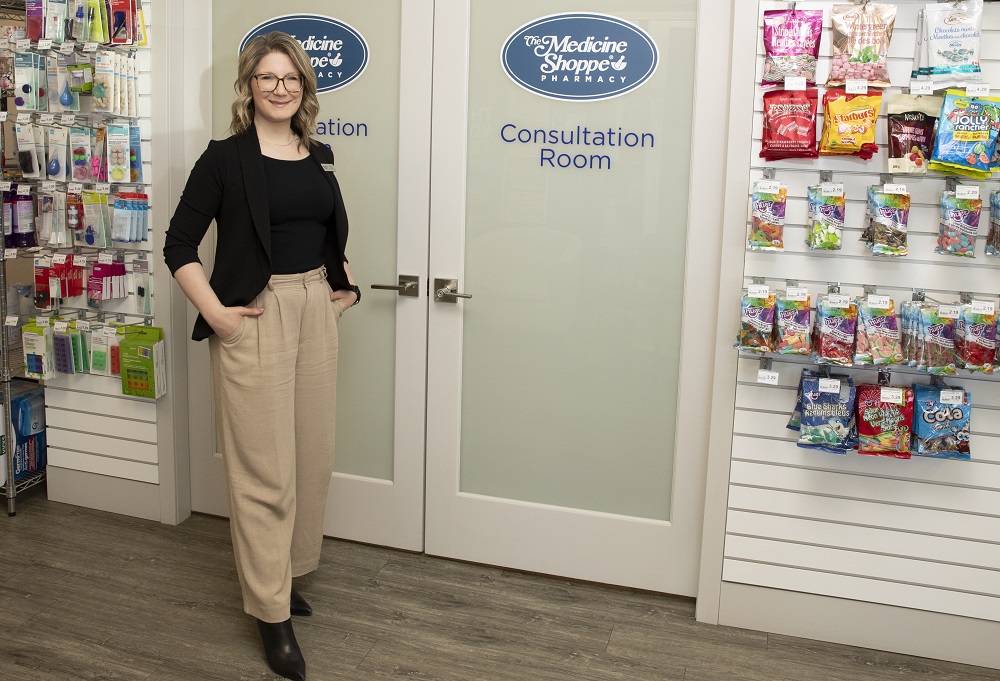
Jodi Cunningham, owner of Medicine Shoppe #395, partnered with Interior Health to offer her pharmacy as a drug-checking site for the region.
BY Michael Mui
Communications Manager, BCPhA
“DRUG ALERT.” The message is in bold red. Samples of down were found in the Cranbrook area that contain benzodiazepine and high concentrations of fentanyl, potentially putting individuals who have access to this product at risk of fatal overdose.
The message continues.
“…reports of people requiring overdose response after using this substance. This is a much higher than average fentanyl concentration and very likely to produce overdose symptoms.”
Underneath the warning is a photo of a sample of the drug on a metal surface. Aside from a slight hue of pink, the drug could easily be mistaken as a pebble.
For the last decade, B.C.’s opioid crisis has been among the top priorities for health care in the province. And while thousands of community pharmacists across B.C. already participate in the delivery of opioid agonist treatment services, a few have found opportunities to go beyond, including Jodi Cunningham, who partnered with Interior Health in late 2023 to operate a publicly funded drug checking service in her Vernon, B.C., pharmacy.
Cunningham, owner of Medicine Shoppe #395, said that this service allows individuals who use substances to visit her pharmacy at any time during store hours to have their drug examined. Typically, the drug can be assessed in minutes to determine the main components, followed by a discussion of known risks or the potential for increased overdose risk based on the substances identified.
“With every sample that we receive, we would communicate to the patient what it is and what’s in it. Our machine matches it to a library of known spectra for known components, and we would tell the patient what it detected,” she said.
If the drug checking technician determines there is potential for substantial risk, they contact the drug checking lead to determine if an alert needs to be issued. There is the opportunity to send complex samples away for a higher level of confirmatory testing if results are inconclusive.

A Fourier-transform infrared spectroscopy machine used to check substances at Medicine Shoppe #395.
B.C.-wide, there have already several alerts issued in the first two months of 2024. A brief glance at the alerts show the various warnings: drugs sold as ketamine containing no ketamine, but benzodiazepines instead; drugs sold as methamphetamine containing no methamphetamine, but ketamine instead; undiluted fentanyl being sold as “down”, a term for heroin; a liquid sold as gamma hydroxybutyrate containing aniline instead; the list goes on.
Despite these alerts, during the previous year, there were 42,172 overdose/poisoning calls reported by the BC Emergency Health Services across the province. These incidents ended in 2,511 deaths. Drug alerts are posted at towardtheheart.com/alerts.
“We’re losing patients regularly and it’s heartbreaking,” Cunningham said. “The reasons behind substance use are complex and vary by individual. As pharmacists, how can we help make drug use as safe as possible and reduce harms while still helping connect people to health services and potentially give them a chance to improve their overall health?”
Cunningham’s pharmacy has been providing the service in June 2023. So far, the pharmacy has checked 217 samples as of the end of January this year.
Cunningham’s store makes up just one of seven sites — and the only pharmacy — throughout the Interior Health region that provide drug checks. Other drug checking locations can be found at drugchecking.ca.
The others are located throughout the region, in Cranbrook, Grand Forks, Nelson, Kamloops, Penticton and Kelowna, and are generally run by community outreach societies. In addition to walking-in to the pharmacy with a drug sample, individuals can also drop off their samples at several collection sites around Vernon. Individuals don’t even have to provide their names, just a sample of the product, and in return, they’ll receive an identification number for the sample so they can follow up with the results, Cunningham said.
Cunningham said she has, for the last five years, had a close relationship with Interior Health’s Vernon mental health and substance use support office, particularly as the pharmacy became involved with opioid agonist treatment delivery services for residents in supportive housing and shelters. In 2023, Cunningham was asked to participate as a drug checking site, and readily said yes.
“It was a no brainer,” she said. “I personally believe that those of us who can do more should do more. Throughout B.C., we’re seeing the effects of the toxic drug crisis. In Vernon, we see a huge problem in the vulnerable and marginalized population here being able to access care. We need to provide more services.”

Pharmacy owner Jodi Cunningham and drug checking technician Danielle Scott pose for a photo inside the pharmacy.
“It was a no brainer,” she said. “I personally believe that those of us who can do more should do more. Throughout B.C., we’re seeing the effects of the toxic drug crisis. In Vernon, we see a huge problem in the vulnerable and marginalized population here being able to access care. We need to provide more services.”
For individuals coming into the pharmacy, a drug checking technician is available five days a week. The visitor will be taken into a consultation area, where the technician will discuss with them the type of drug they believe they have, the expected effects, before the sample is placed in a Fourier-transform infrared spectrometer for testing.
“Around that time, we have a good opportunity to connect with that person and discuss other harm reduction measures, education around substance use, education around resources, available treatment services and support services. It’s an opportunity to try to connect them to further supports in the community if they are needed,” Cunningham said.
Jessica Bridgeman, manager of the harm reduction program with Interior Health, said a pharmacy was an ideal location for a drug checking site. It’s open and welcome to anyone in the public, and the idea was that this openness could possibly reduce the fear of stigma for individuals users who wish to have their substances checked.
Drug checking in B.C. had its start as a service provided at various music festivals around the province, she said. Starting in 2018, Interior Health began partnering with groups in the community to provide permanent drug checking locations with the aim of helping drug users make more informed decisions about substance use.
“Pharmacies are a good place for it. It’s a neutral space. You can go to a pharmacy that’s not where your usual pharmacist is and be anonymous. They have long opening hours, have storefronts and are just really accessible,” said Antoine Marcheterre, drug checking lead with Interior Health.
“And the truth of it is, most of the population will visit a pharmacy at some point, for their prescriptions or for other purchases. It’s a convenient place.”
Marcheterre and Bridgeman said community pharmacies in the Interior Health region that would be interested to get more involved with drug checking efforts can express their interest in distributing fentanyl test strips as one more tool in their harm-reduction kit. In B.C., 877 community pharmacies already distribute naloxone kits.
“If a pharmacy was ever interested in becoming a fully fledged drug-checking site, with a technician and instrument and all that, it would be good if they were already involved in some form of harm reduction activity,” Marcheterre said. “Fentanyl test strips would be a good first step in that direction.”
Those pharmacies that are interested in distributing fentanyl test strips can apply by completing a form on the Interior Health website. The process of handing out the kits is similar to distributing COVID-19 test kits. Pharmacists who distribute the kits are asked to, if possible, instruct the patient how to use the kit, or provide them information on how the patient can access the instructions themselves.
For the fentanyl test strip order form, a brief course on how to use the strips and other resources, please visit:
interiorhealth.ca/information-for/community-partners/harm-
reduction#resources-for-drug-checking-sites

The above is an advertisement. For advertising inquiries, please contact michael.mui@bcpharmacy.ca
